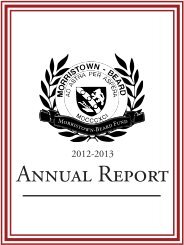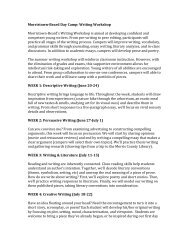Bench Talk #2 Know Who You Are October 5, 2012 I firmly believe ...
Bench Talk #2 Know Who You Are October 5, 2012 I firmly believe ...
Bench Talk #2 Know Who You Are October 5, 2012 I firmly believe ...
Create successful ePaper yourself
Turn your PDF publications into a flip-book with our unique Google optimized e-Paper software.
<strong>Bench</strong> <strong>Talk</strong> <strong>#2</strong><br />
<strong>Know</strong> <strong>Who</strong> <strong>You</strong> <strong>Are</strong><br />
<strong>October</strong> 5, <strong>2012</strong><br />
I <strong>firmly</strong> <strong>believe</strong> that most of us have an inclination to be good people.<br />
However, sometimes societal pressure and social restraint make us lose track of our<br />
natural selves, and it brings out our competitive, cutthroat, warring—sometimes<br />
mean‐‐ selves. When these outside forces have a louder voice than the voice within<br />
us, then we can make bad choices and hurt ourselves and hurt other people.<br />
Those who are most vulnerable to these bad choices are people who are insecure<br />
about their own identities.<br />
Without a strong sense of self, we are also vulnerable to people who force others to<br />
behave in certain ways. We are vulnerable to leaders who prompt girls or boys to<br />
do destructive things to others. This kind of person is not a leader but a bully. I am<br />
sure on our own we can think of examples of people who lead through artificial<br />
power, power that they get because people are afraid of them.<br />
True leadership begins with knowing who you are and being comfortable with who<br />
you are, and when this happens, you can make other people comfortable with who<br />
they are.<br />
We tend to follow people who are authentic. Followers grant a leader their<br />
cooperation when they perceive natural integrity, and this comes from this sense of<br />
self that I am talking about. Today I am going to tell you a story about an authentic<br />
leader.<br />
I realize some of you might think that leadership is not something you aspire to, but<br />
it should be. It might seem self‐promoting and self‐aggrandizing to think that you<br />
can be a leader, but it isn’t. All of you should aspire to be leaders if being a leader<br />
means inspiring those around you to be their best selves.<br />
I do not usually talk about the National Football League, and trust me, I am not an<br />
expert on this topic, but this morning I am briefly going to look at it from a cultural<br />
standpoint and from the question of authentic leadership and identity.<br />
I want to emphasize that there are many good men in the National Football League.<br />
But there are also felons; there are men who have stolen things and assaulted<br />
people. There are men who have been encouraged to purposely injure other men<br />
during a game. There are men who physically and emotionally hurt their wives and<br />
friends. There are also good men and upstanding men and family men. So how does<br />
a good man emerge from such a complex, wide‐ranging culture of the NFL to be a<br />
leader of such a diverse group of men?
Although this player that I want to examine has an unwritten future, although we<br />
cannot know what his career or life will ultimately look like because he is only<br />
twenty‐five, during a specific period of time last fall and winter he was able to lead<br />
his team to heights none of them ever dreamed of, and I want to briefly look at his<br />
weeks of leadership under those conditions. In the weeks preceding his leadership,<br />
his team was losing, and they had a first‐year coach. Morale was low.<br />
This leader is not a beautiful player; there are abundant flaws to his game. He is<br />
slow to throw; he has an inefficient and unorthodox throwing arm, and he has<br />
trouble reading the field. Some of you know this quarterback because he was the<br />
most written about quarterback last year. I am not promoting him as a player or his<br />
old team or his new team or his religion. But I would like to tell you the brief history<br />
of this team’s turn‐around last winter due to this player’s leadership. Of course, all<br />
of us know I am talking about Tim Tebow.<br />
I do not know everything there is to know about Tebow, but here is what I can tell<br />
you about last season: around week 7, Tebow got his chance to start, and he did<br />
well. Soon his fellow players began to grant him power as a leader. He did not lead<br />
by force or by bullying or even by being cool. Players voluntarily followed him.<br />
Interestingly, on the barometer of coolness, Tim Tebow is nowhere near the list for<br />
the top 20 coolest players in the NFL as produced in last August’s Bleacher Report.<br />
It is remarkable, really, that Tebow was not laughed out of the locker room with the<br />
words of inspiration he gave the team. Quoting from the Bible to a diverse group of<br />
players when you are twenty‐four years old and relatively new on the team is risky,<br />
especially when the other players do not necessarily <strong>believe</strong> in the things you<br />
<strong>believe</strong> in.<br />
But no one laughed at him. They trusted him. After a bad start to the season, under<br />
Tebow the team had five fourth‐quarter comebacks and three overtime wins. In the<br />
overtime of their playoff game, Tebow launched an 80 yard pass that won the game<br />
in an upset and was the fastest overtime win in NFL history.<br />
That is the end of Tim Tebow’s story on that particular team. He was traded away,<br />
and now he has a new team. He is not getting much playing time, and some people<br />
are still saying negative things about his playing ability and his constant references<br />
to his religion, but many people <strong>believe</strong> that this season he has inspired the player in<br />
front of him to be a better leader. This is another form of leadership: inspiring<br />
others to be their best selves. Many feel that Tebow’s arrival to the team inspired<br />
Sanchez to work harder, to train more than he ever had, to study more film, and to<br />
take a stronger leadership role (despite Sanchez’s performance last week). Because<br />
of Tebow’s presence, Sanchez is a better leader.<br />
Authentic leadership comes from knowing who you are. It means knowing your own<br />
limits and potential; it means putting your weaknesses out there even as you are<br />
proud of your strengths. If you can be comfortable in your own skin, you will
inspire others to feel naturally comfortable with who they are, even if it is different<br />
from you, and I have one short story to end with.<br />
I have a friend who is a junior in college. He is a really bad singer, but he loves to<br />
sing, especially show tunes and love songs. He sings in the shower; he sings when<br />
he is driving; and he sings publicly any chance he gets even on the men’s lacrosse<br />
bus and even when no one else joins him. And <strong>believe</strong> me, he does not sing softly;<br />
his voice is a full‐throated yelp.<br />
He knows he is worse than bad; he is off pitch, but he is OK with that because<br />
singing makes him happy. He is not confined by an outside measurement of his<br />
singing ability. Standardized scales and notes are meaningless to him. Nor is he<br />
defined by standard protocol of male lacrosse players. He is dictated by his own<br />
metaphorical pitch–however painful his notes are to the people around him. And<br />
for this reason, he is a good example of someone who is comfortable in his own skin.<br />
And in truth, the joy he achieves through singing gives joy to those around him‐‐<br />
except perhaps the players on the lacrosse bus, but since he is the biggest and<br />
strongest member of the team and the only long‐stick middie, no one bothers him<br />
about it.<br />
<strong>You</strong> are doomed for hardship if you try to live someone else’s life or if you try to live<br />
by some abstract norm. Do not betray who you are to satisfy others or to satisfy<br />
some external expectation for the approval of others. Define and claim yourselves.<br />
Listen to the voice within and be comfortable with who that is. This will allow you to<br />
be your best self. And if you can do that, you will inspire others to join you and be<br />
their best selves, too.










